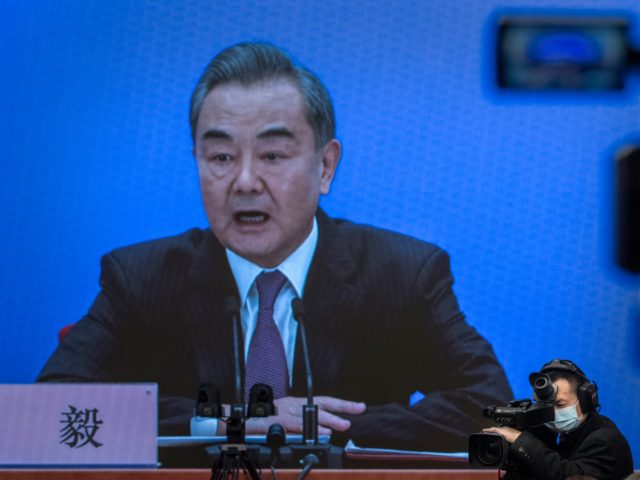Chinese Foreign Minister Wang Yi visited Iran on Friday during a tour of six Middle Eastern nations and demanded a leading role in sustaining the Iran nuclear deal, presenting China as the new global hegemonic power and the only honest mediator between Tehran and the Western world.
China’s state-run Global Times noted Wang (pictured) is “the highest-ranking Chinese diplomat to pay an official visit to Iran since Chinese President Xi Jinping’s visit in 2016,” and his visit comes at a moment of uncertainty for Iran’s regional ambitions, as the new U.S. administration considers rejoining the Joint Comprehensive Plan of Action (JCPOA), i.e. the nuclear deal.
Wang’s very presence was meant as a show of Beijing’s support for Tehran, an increasingly important player in China’s imperial Belt and Road Initiative (BRI). He reportedly wasted no time positioning China as the broker that can repair the JCPOA, as part of China’s ostensible conviction that “getting rid of geopolitical competition among great powers is the fundamental way to end the chaos” in the Middle East:
As for the Iranian nuclear issue, Wang pointed out that the US should take concrete measures to ease unilateral sanctions against Iran and its “long-arm jurisdiction” over third parties, while Iran should resume fulfilling its nuclear commitments. At the same time, the international community should support the efforts of regional countries to establish a Middle East zone free of nuclear and other weapons of mass destruction.
All parties should discuss and formulate a route and timetable for the resumption of implementation of the JCPOA in accordance with the merits of the development of the Iranian nuclear issue, Wang said.
In the meeting between Wang Yi and Russian Foreign Minister Sergey Lavrov on Monday, the two senior diplomats called on Iran to resume compliance and encouraged the JCPOA’s due role in preventing nuclear proliferation. The two sides also believe that the United States should unconditionally return to the JCPOA as soon as possible and revoke the unilateral sanctions against Iran.
The Global Times cited Chinese analysts who insisted on Beijing can be a “peace broker” on the JCPOA, and indeed “no other major international issue can be separated from China’s participation and coordination.”
These analysts pointed to China’s drubbing of the Biden administration at last week’s meeting in Alaska as evidence that China has displaced the weakened United States as the indispensable mediator of global order. They suggested Wang’s mere presence would “inject stability into the Middle East and Iran” after allegedly destabilizing military exercises held by the U.S., France, Belgium, and Japan in Middle Eastern waters.
The Global Times and its “experts” insidiously suggested China and Iran could work together to rehabilitate the reputation of “autocracy” by increasing their strategic cooperation and presenting their authoritarian alliance as an alternative to “unilateralism and bullying behavior” from the Western world, as Iran’s ambassador to China put it.
“Middle Eastern states are happy to see China playing a bigger role in regional affairs, and China will also exchange views with these countries on such affairs and contribute Chinese wisdom to peace in the Middle East,” the Chinese Foreign Ministry claimed.
Iranian state media reported on Friday that Iran and China intend to sign a 25-year cooperation agreement during Wang’s visit. The accord is said to include Chinese investments in key sectors of the Iranian economy, giving China even more of a “legitimate interest” it can assert the right to “defend” by inserting itself into Middle Eastern politics.
The Diplomat reported in early March that China’s accord with Iran would “provide an influx in capital to Iranian industries including banking, infrastructure, telecommunications, and transportation sectors in exchange for discounted oil” – and leaked documents suggested the pact would also “pave a path for additional military cooperation in the region.”

COMMENTS
Please let us know if you're having issues with commenting.